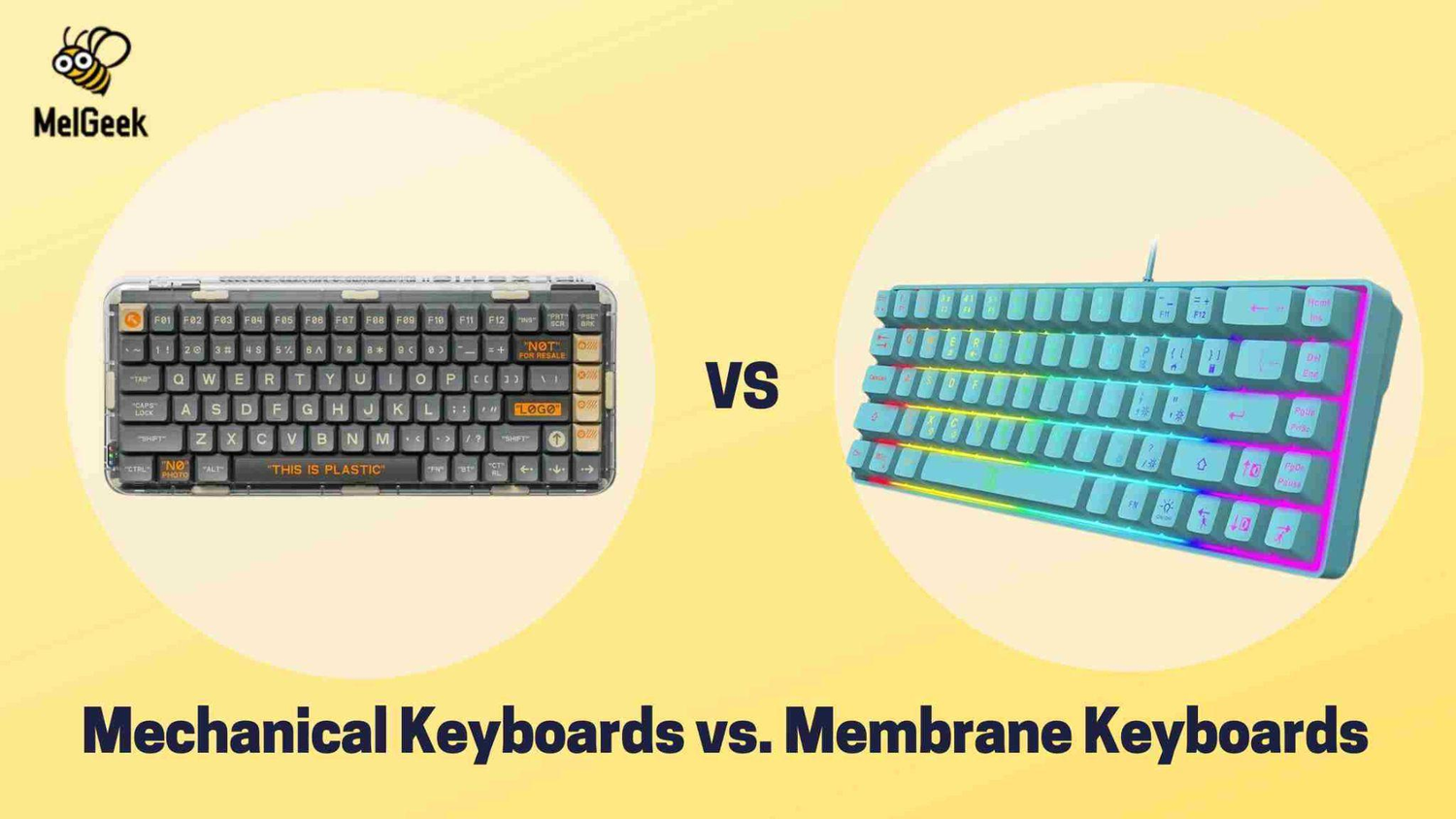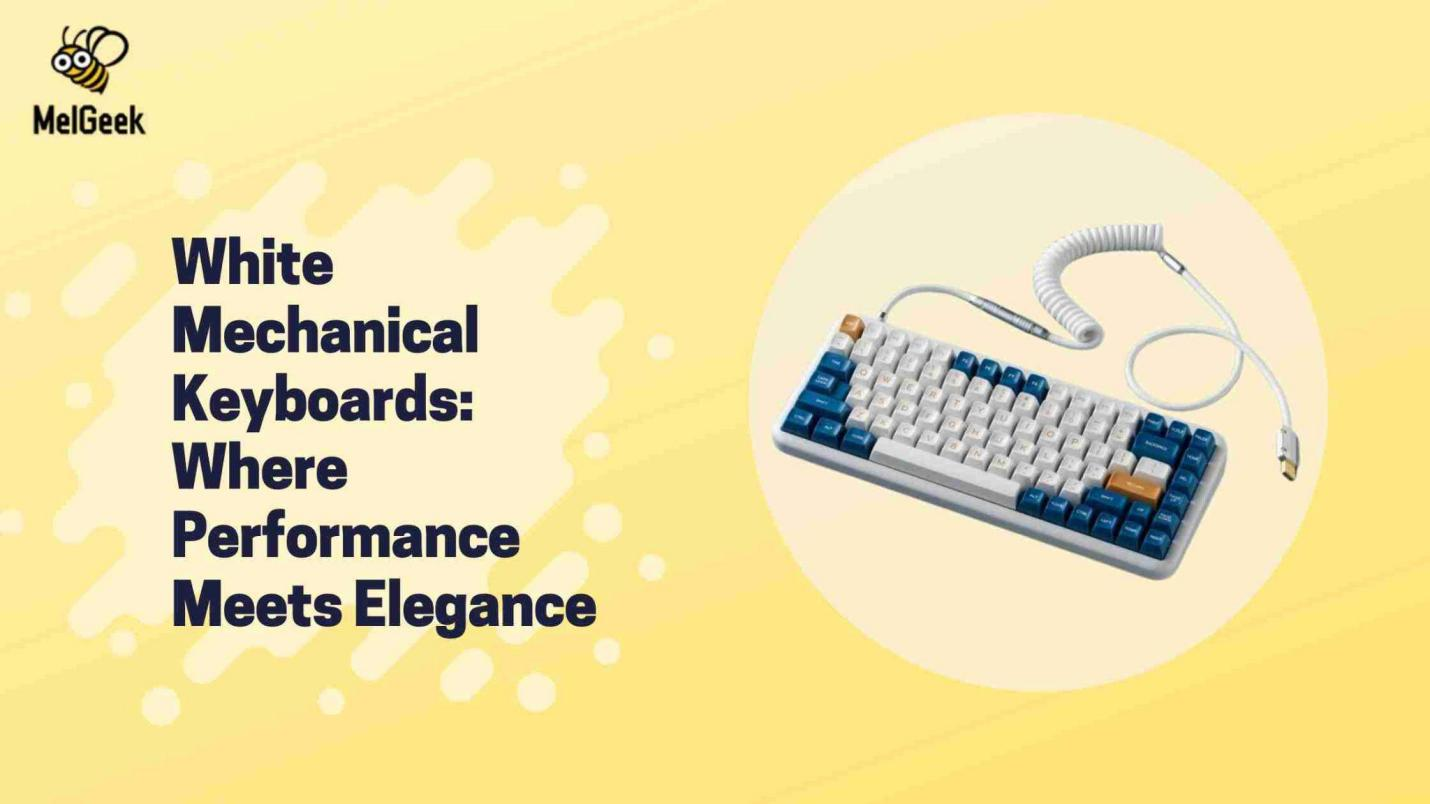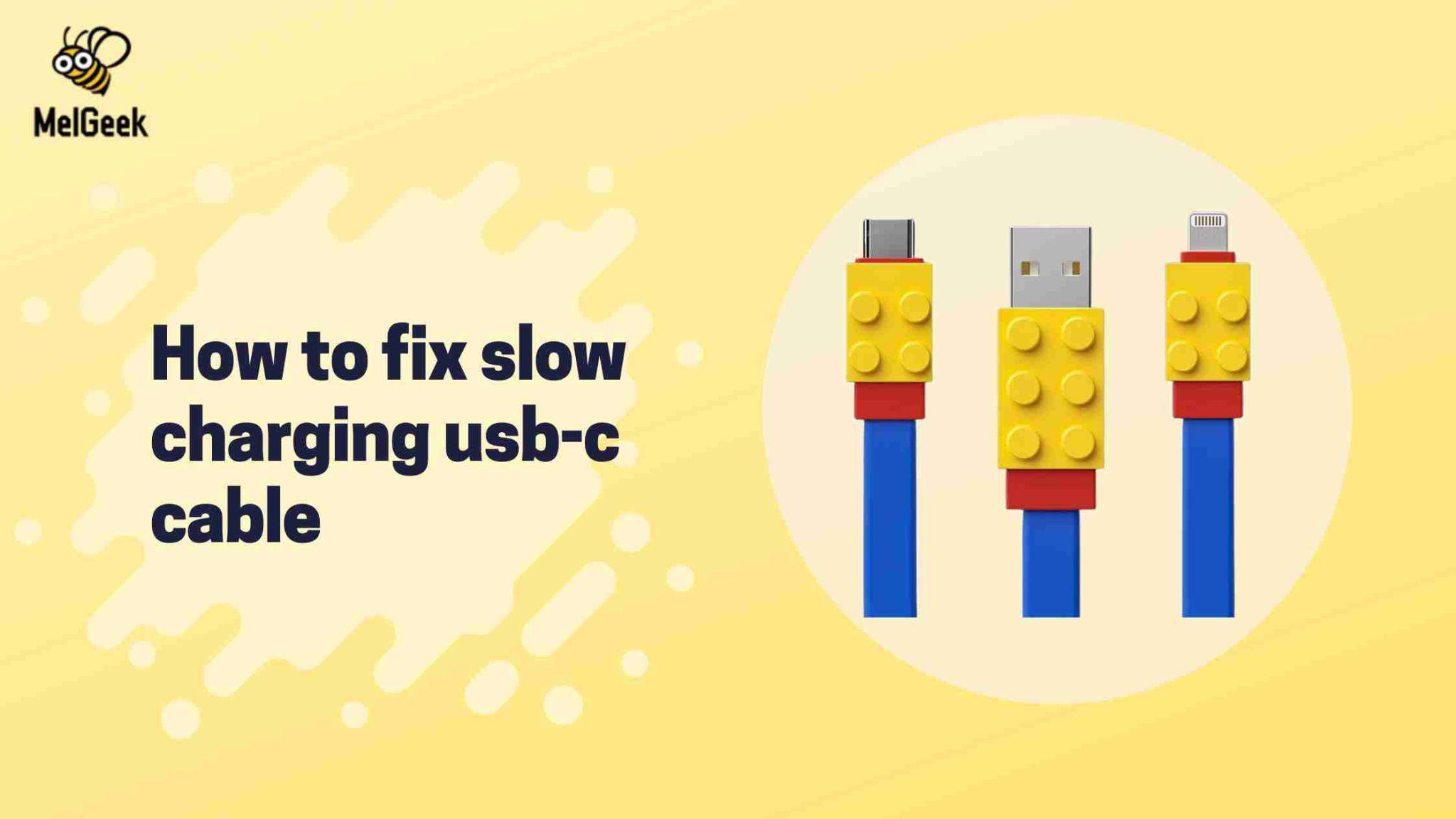Mechanical Keyboards vs. Membrane Keyboards

We are going to discuss mechanical vs membrane keyboards here. With a mechanical keyboard, you can type more tactilely and responsively since each key has its own mechanical switch. Membrane keyboards, on the other hand, include a rubber or silicone membrane under the keys, which makes typing quieter but frequently less haptic. Because mechanical keyboards provide faster actuation and tactile feedback, many people prefer them for gaming. Because mechanical switches provide simultaneous key presses and are often more sensitive, they are ideal for gaming applications where accurate and fast inputs are crucial. Yes, interchangeable keycaps are a common feature of mechanical keyboards, letting you customize the appearance and feel of your keyboard. You may personalize keycap sets to your preference from a large selection that comes in a range of colours, materials, and styles. Membrane keyboards are a cost-effective choice since they are often less expensive than mechanical keyboards. Because of their slender and flexible shape, they are often also more portable and lighter. Furthermore, in settings like workplaces or shared areas where noise reduction is needed, the absence of audible click noises might be advantageous. Durability is a well-known feature of mechanical keyboards. These keyboards' individual mechanical switches are incredibly strong and long-lasting, built to survive millions of keystrokes. Membrane keyboards are still rather sturdy, although with time, the rubber or silicone membrane beneath the keys may gradually deteriorate and cause wear and tear. Mechanical keyboards are often more comfortable for many people to use when typing lengthy texts or programming jobs. The mechanical switches' tactile feedback helps lessen finger strain and increase typing accuracy. Still, a lot depends on personal opinion; for prolonged typing sessions, some people might prefer the softer feel of membrane keyboards. We are discussing here mechanical keyboard vs membrane, mechanical keyboards are more prone to the accumulation of dust and dirt. There are more moving components and crevices in mechanical switches, which can draw in and hold dust particles. It is advised to do routine cleaning and maintenance to maintain the best possible condition and smooth, reliable key actuation on your mechanical keyboard.
Understanding the Basics
A keyboard that employs mechanical switches rather than membrane switches is called a mechanical keyboard. This indicates that a mechanical keyboard includes switches below each key that are in charge of recording keystrokes.
There are several parts to mechanical keyboards, such as the
Case
Keeps everything in place. May be constructed from laser-cut plastic, polycarbonate, or machined metal.
The keyboard's "brain" is the circuit board (PCB). Includes resistors, diodes, and controller components.
Dish
Influences how the keystrokes feel. It might be a 1.5 mm hole-perforated sheet of FR4, metal, carbon fibre, or plastic.
Switches: Each key has a mechanical switch underneath it. Switches come in three primary types: clicky, tactile, and linear.
Keychains
Places your fingers on top of the switches and press them. A keycap's pushdown mechanism triggers the keystroke by pressing on it.
Linear
Most gamers favor these switches because they feel smooth when pressed from top to bottom. The fastest and smoothest transitions are linear ones.
Tactile: There is a significant bump on these switches around halfway down when the key is pressed. Because of the feedback, tactile switches are typically preferred by touch typists. Most people are familiar with the Cherry MX Brown tactile switch.
Click-y
These switches work similarly to tactile switches in terms of functionality, but there's a click sound when you go over the hump. With every keystroke, clicky switches provide a noticeable jolt and loud, clicky feedback. While typing on them might be quite fulfilling, they can also irritate those around you. Red switches are linear and silent, whereas purple switches are clicky and noisy. Purples are 1.5 times slower than reds, which are 5.
A membrane keyboard is a computer keyboard that has pressure pads in place of individual moving elements for the keys. The keys are printed with symbols and outlines on a flexible, flat surface. Membrane keypads are created by printing conductive and coloured inks onto polyester or polycarbonate films. They are also known as membrane switches or membrane keyboards. While the printed circuitry layers are contained in the bottom levels, the top layer generates the graphical design.
Membrane keyboards employ a flexible plastic sheet that is imprinted on both the bottom with electrically conductive ink and the top with the key design. The top layer contacts the bottom circuit when a key is pushed, pushing it through a spacer layer of holes.
Three layers make up membrane keyboards:
Pliable plastic film: Printed with conductive ink and a key design on top: On the sheet's reverse side
Spacer layer: Has perforations where pressing two conductive keypads comes into contact.
Comparative Analysis

So there are several differences membrane vs mechanical keyboards such as:
Sturdiness
With a lifespan of 30–70 million key presses as opposed to 5 million for membrane keyboards, mechanical keyboards are made to endure longer than membrane keyboards.
Force of action
Compared to membrane keyboards, mechanical keyboards require greater force to push the keys.
Feel of typing
With a rubber or silicone membrane behind the keys, membrane keyboards allow for quieter but less tactile typing.
Price
In general, membrane keyboards are less costly than mechanical ones.
Features
Additional functions that membrane keyboards may offer include USB pass-through, RGB illumination, and media controls.
Rollover of keys
In general, it is believed that mechanical keyboards register more keystrokes simultaneously than membrane keyboards.
Personalization
Compared to membrane keyboards, mechanical keyboards provide greater customization possibilities.
There are several performance factors where mechanical keyboards and membrane keyboards diverge, such as:
Sturdiness
Because mechanical keyboards employ actual switches rather than a rubber membrane, they are more resilient than membrane keyboards. Mechanical keyboards have an average lifespan of up to ten years as they can sustain up to 70 million keystrokes. Membrane keyboards, on the other hand, are highly prone to wear out.
Feedback in tactile terms
Touchscreen feedback is a well-known feature of mechanical keyboards. Keyboards with membranes do not provide the same strong tactile feedback as those with mechanical components.
Adaptability
In comparison to conventional membrane keyboards, mechanical keyboards provide better typing accuracy, quicker reaction times, and a more pleasurable typing experience. Keystroke accuracy and speed can be affected by the additional force needed to record keystrokes on membrane keyboards due to their membrane layers.
Rollover of keys
A critical rollover function on mechanical keyboards allows many critical pushes to be detected at once. This capability is necessary for quick typing, gaming, crouch jumping, and other activities. One important rollover function is absent from the membrane keyboard.
Personalization
You may customize mechanical keyboards to suit your own needs. You have control over how it feels, sounds, and appears.
User Experience
Consider the following before purchasing a mechanical keyboard:
Construct superior
A top plate made of metal, strong construction, and an ergonomic shape are some things to look for.
Switches made of metal
These establish the actuation force, feel, and sound needed for each key push.
Feedback in tactile terms
With the physical and auditory feedback that mechanical keyboards provide, typists can increase their typing speed and mistake detection.
Coziness
Because each key on a mechanical keyboard has a distinct switch beneath it, your fingers will react more quickly and smoothly while typing on one of these keyboards.
Precision
Keyboards with mechanics provide more precision.
Finger fatigue
The mechanical switches' tactile feedback helps lessen finger strain and increase typing accuracy.
Typers, casual computer users, and gamers all like mechanical keyboards. They cost more, though, and have a higher volume than conventional membrane keyboards.
Cost Analysis
So membrane keyboard vs mechanical keyboard, there are a number of considerations when comparing the prices of membrane versus mechanical keyboards for original equipment manufacturers. Since membrane keyboards are easier to design and manufacture, they are usually cheaper. Rubber domes and flexible membranes, for example, are materials included in membrane keyboards that are often less costly than the individual mechanical switches present in mechanical keyboards. Membrane keyboards further reduce production costs by requiring fewer parts and simpler assembly. On the other hand, the materials and manufacturing of mechanical keyboards are more expensive. Because each mechanical switch is a precisely built part, its initial cost is greater. They are also frequently constructed from sturdy materials like metal and premium plastics. The cost of both mechanical and membrane keyboards increases as more customizable features like keycaps, switch types, and illumination are added. The cost of membrane keyboards is one of their main benefits. They provide OEMs trying to save costs without sacrificing quality with an affordable choice. Although mechanical keyboards often have a greater initial cost, their long-term advantages may exceed the expenses due to their durability and adjustable capabilities.
Although mechanical keyboards cost more than their membrane counterparts on average, they aren't always ideal for gaming. But unlike mechanical keyboards, membrane keyboards may need forceful key pushes to complete a task. It all comes down to how you want the feel of your deck beneath your fingertips in the end. Here, we'll go over the distinctions between mechanical and membrane keyboards as well as the benefits of each kind.
Choosing the Right Keyboard for You

For typing and gaming, mechanical keyboards are frequently regarded as the greatest option. For those who spend a lot of time on the keyboard—gamers and typists—they are made to last. In addition, tactile sensation with mechanical keyboards is superior and more accurate than with membrane-switch keyboards.
Taking into account the following factors might help you select a mechanical keyboard:
Type of key switch: Mechanical keyboards with switches tailored for gaming are frequently preferred by gamers. Due to its smooth and constant typing without tactile bumps, linear switches like the Cherry MX Red and Gateron Red are well-liked options.
Size: Full-size and Tenkeyless keyboards are available.
Construction quality: Mechanical keyboards have a sturdy build.
Tactility: Compared to membrane-switch keyboards, mechanical keyboards provide a more tactile feel. The response you receive when you push a key is known as tactile. According to some, a mechanical gaming keyboard can be a wise investment for everyday computer use. You can make corrections and adjustments more quickly using the keyboard feedback than with screen-based assistance.
Bestselling keyboards are available at https://www.melgeek.com/. Melgeek 68 and 84 have a protracted, seductive display. They include a gasket mount mechanism and a polling rate of 1000 Hz. Mojo68 is a wireless mechanical keyboard with 68 keys in ANSI style. A nice typing sound is produced by the silicone pad, poron foam, and integrated poron switch mat in conjunction with the Gasket Mount design.
Additionally, Mojo68 Plastic's seamless connection reactivity made it the ideal accessory for both work and play. Because Mojo68 is hot-swappable, switching between switches and updating is simple. The PCB guarantees a longer lifespan with gold plating and anti-oxidation technology, and it lets you modify your keyboard without the need for soldering. However, Mojo84 is a wireless mechanical keyboard with an ANSI layout and 84 keys. A nice typing sound is produced by the silicone pad, poron foam, and integrated poron switch mat in conjunction with the Gasket Mount design. Its triple mode facilitates a seamless connection with a smooth connecting response. Mojo84 is a wireless mechanical keyboard with 84 keys in ANSI style. A nice typing sound is produced by the silicone pad, poron foam, and integrated poron switch mat in conjunction with the Gasket Mount design. Its triple mode facilitates a seamless connection with a smooth connecting response.
FAQs
- **Can I switch from a membrane to a mechanical keyboard easily?**
It is possible to convert from a membrane keyboard to a mechanical keyboard, but doing it effectively involves technical know-how and runs the risk of damaging the keyboard.
- **Are mechanical keyboards really better for gaming?**
Compared to other keyboard types, mechanical keyboards may be superior for gaming.
- **How long do mechanical keyboards last compared to membrane keyboards?**
Compared to membrane keyboards, mechanical keyboards have a 6–14 times longer lifespan.
- **Is the noise of a mechanical keyboard too disruptive?**
Particularly when typing, mechanical keyboards may be loud, which can be annoying in calm spaces.
- **Can I customize a membrane keyboard like a mechanical one?**
Although changing the keycaps on a membrane keyboard is theoretically feasible, it's not as common or simple as it is with mechanical keyboards.



